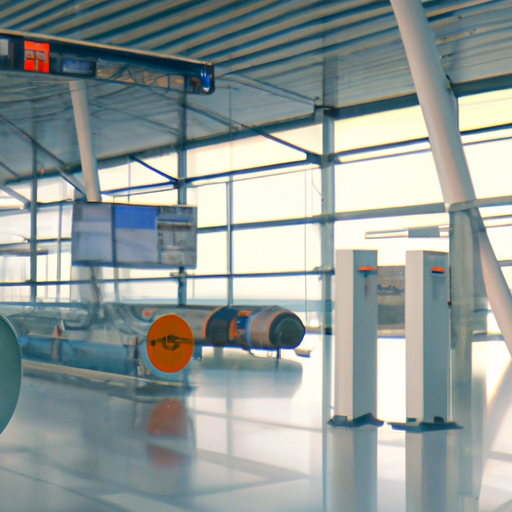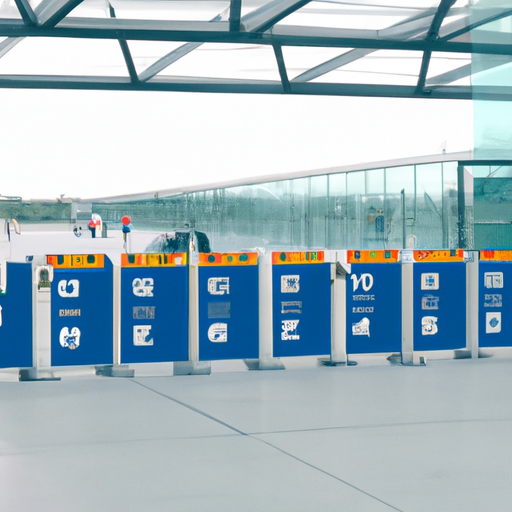
Improving Efficiency and Safety: AI-driven technologies for baggage handling at Berlin Brandenburg Airport
Berlin Brandenburg Airport is one of the busiest airports in Germany, serving millions of passengers each year. With such a high volume of travelers, it is crucial to have efficient and safe baggage handling processes in place. To enhance these processes, the airport has turned to artificial intelligence (AI) technologies, which have proven to be a game-changer in improving efficiency and safety.
One of the main challenges in baggage handling is ensuring that each bag reaches its intended destination without any delays or mishaps. With traditional manual processes, there is always a risk of human error, leading to misplaced or lost luggage. However, with AI-driven technologies, such as computer vision and machine learning algorithms, the airport has been able to significantly reduce these risks.
Computer vision technology allows the airport’s baggage handling system to accurately track and identify each bag as it moves through the various stages of the handling process. This technology uses cameras and sensors to capture images of the bags, which are then analyzed by AI algorithms. These algorithms can quickly and accurately match each bag with its corresponding flight and destination, ensuring that it is loaded onto the correct aircraft.
Machine learning algorithms play a crucial role in improving the efficiency of baggage handling at Berlin Brandenburg Airport. These algorithms are trained on vast amounts of data, allowing them to learn and adapt to different scenarios. By analyzing historical data on baggage handling, the algorithms can identify patterns and make predictions about potential issues or bottlenecks in the process. This enables the airport to proactively address these issues, minimizing delays and ensuring a smooth flow of baggage.
In addition to improving efficiency, AI technologies also enhance safety in baggage handling. For example, computer vision systems can detect and flag any suspicious or prohibited items in the bags. This helps airport security personnel to quickly identify potential threats and take appropriate action. By leveraging AI, Berlin Brandenburg Airport can ensure that all bags are thoroughly screened, reducing the risk of security breaches.
Furthermore, AI technologies can also help prevent baggage mishandling by identifying bags that require special handling. For instance, fragile items or bags with perishable goods can be flagged by the system, ensuring that they are handled with extra care. This not only improves the overall customer experience but also reduces the likelihood of damage to valuable or sensitive items.
The implementation of AI-driven technologies in baggage handling at Berlin Brandenburg Airport has been a resounding success. The airport has seen a significant reduction in lost or misplaced luggage, leading to increased customer satisfaction. Moreover, the efficiency gains have allowed the airport to handle a higher volume of bags without compromising safety or quality.
As AI continues to advance, there is great potential for further improvements in baggage handling processes. For example, the integration of robotics and automation can streamline the physical handling of bags, reducing the reliance on manual labor. Additionally, AI algorithms can be continuously refined and optimized to further enhance efficiency and safety.
In conclusion, AI-driven technologies have revolutionized baggage handling at Berlin Brandenburg Airport. By leveraging computer vision and machine learning algorithms, the airport has been able to improve efficiency, enhance safety, and provide a better experience for passengers. As technology continues to evolve, we can expect even more advancements in the field of baggage handling, making air travel smoother and more enjoyable for everyone.
Streamlining Operations: How AI can optimize aircraft ground handling processes at Berlin Brandenburg Airport

Berlin Brandenburg Airport is one of the busiest airports in Germany, serving millions of passengers each year. With such a high volume of air traffic, it is crucial for the airport to have efficient and streamlined ground handling processes. This is where artificial intelligence (AI) comes into play, offering innovative solutions to enhance handling operations.
One of the main challenges in ground handling is the coordination of various tasks, such as baggage handling, aircraft servicing, and passenger boarding. Traditionally, these processes have been managed manually, leading to potential delays and inefficiencies. However, with the integration of AI technologies, Berlin Brandenburg Airport has been able to optimize these operations and improve overall performance.
AI-powered systems can analyze real-time data from multiple sources, including flight schedules, weather conditions, and passenger information. By processing this information, AI algorithms can generate accurate predictions and recommendations for ground handling operations. For example, AI can anticipate potential delays caused by adverse weather conditions and suggest alternative routes or rescheduling options.
Furthermore, AI can optimize baggage handling processes by automating the sorting and routing of luggage. By using computer vision and machine learning algorithms, AI systems can accurately identify and track bags, ensuring that they are loaded onto the correct aircraft. This not only reduces the risk of mishandled baggage but also improves the overall efficiency of the airport’s operations.
In addition to baggage handling, AI can also enhance aircraft servicing processes. Maintenance tasks, such as refueling, cleaning, and restocking, can be optimized through AI-powered systems. These systems can analyze historical data and maintenance schedules to predict when specific tasks need to be performed. By doing so, AI can help reduce downtime and ensure that aircraft are ready for departure on time.
Moreover, AI can improve passenger boarding processes by providing personalized recommendations and assistance. For instance, AI-powered chatbots can answer common questions, provide flight updates, and offer suggestions for nearby amenities. This not only enhances the passenger experience but also reduces the workload on airport staff, allowing them to focus on more complex tasks.
While AI offers numerous benefits for ground handling processes, it is important to address potential challenges and concerns. One of the main concerns is the integration of AI systems with existing infrastructure and technologies. However, with proper planning and collaboration between airport authorities and AI developers, these challenges can be overcome.
Another concern is the potential impact on the workforce. As AI automates certain tasks, there may be a need for reskilling or reassigning employees. However, AI should be seen as a tool to enhance human capabilities rather than replace them. By automating repetitive and mundane tasks, AI allows employees to focus on more critical and value-added activities.
In conclusion, AI has the potential to revolutionize ground handling processes at Berlin Brandenburg Airport. By leveraging real-time data and advanced algorithms, AI can optimize baggage handling, aircraft servicing, and passenger boarding operations. While there may be challenges in integrating AI systems and addressing workforce concerns, the benefits of enhanced efficiency and improved passenger experience make it a worthwhile investment. With AI as a partner, Berlin Brandenburg Airport can continue to streamline its operations and maintain its position as a leading hub for air travel.
Enhancing Passenger Experience: AI-powered solutions for seamless check-in and boarding procedures at Berlin Brandenburg Airport
Enhancing Handling Processes at Berlin Brandenburg Airport with AI
Berlin Brandenburg Airport is one of the busiest airports in Europe, serving millions of passengers each year. With such a high volume of travelers, it is crucial to have efficient handling processes in place to ensure a seamless experience for passengers. To achieve this, the airport has turned to the power of artificial intelligence (AI) to enhance its handling procedures.
One area where AI has made a significant impact is in the check-in process. Traditionally, passengers would have to wait in long queues to check-in, leading to frustration and delays. However, with the implementation of AI-powered solutions, this has become a thing of the past. Passengers can now check-in seamlessly using self-service kiosks that are equipped with facial recognition technology.
The facial recognition technology allows passengers to simply scan their passports and have their faces matched with their travel documents. This not only speeds up the check-in process but also enhances security by ensuring that the person checking in is the rightful owner of the passport. It is a win-win situation for both passengers and airport authorities.
Furthermore, AI has also revolutionized the boarding procedures at Berlin Brandenburg Airport. Gone are the days of boarding passes and manual checks. With the help of AI, passengers can now board the aircraft using biometric boarding gates. These gates use facial recognition technology to match the passenger’s face with their boarding pass, allowing for a seamless and efficient boarding process.
The benefits of AI-powered handling processes extend beyond just check-in and boarding. Baggage handling is another area where AI has made a significant impact. With the use of AI algorithms, baggage can now be tracked in real-time, ensuring that it reaches the correct destination. This not only reduces the chances of lost luggage but also allows passengers to track their bags throughout their journey, providing them with peace of mind.
Additionally, AI has also improved the overall efficiency of the airport’s operations. By analyzing data from various sources, such as flight schedules, passenger traffic, and weather conditions, AI algorithms can predict potential bottlenecks and optimize resources accordingly. This allows for better resource allocation, reducing delays and improving the overall passenger experience.
The implementation of AI-powered solutions at Berlin Brandenburg Airport has not only enhanced the handling processes but has also improved the overall passenger experience. Passengers can now enjoy a seamless check-in and boarding process, with reduced waiting times and increased security. Furthermore, the real-time tracking of baggage ensures that passengers can travel with peace of mind, knowing that their belongings are in safe hands.
As technology continues to advance, it is clear that AI will play an increasingly important role in enhancing handling processes at airports worldwide. Berlin Brandenburg Airport is just one example of how AI can revolutionize the way airports operate, providing passengers with a more efficient and enjoyable travel experience. With AI-powered solutions, the future of air travel looks brighter than ever.


